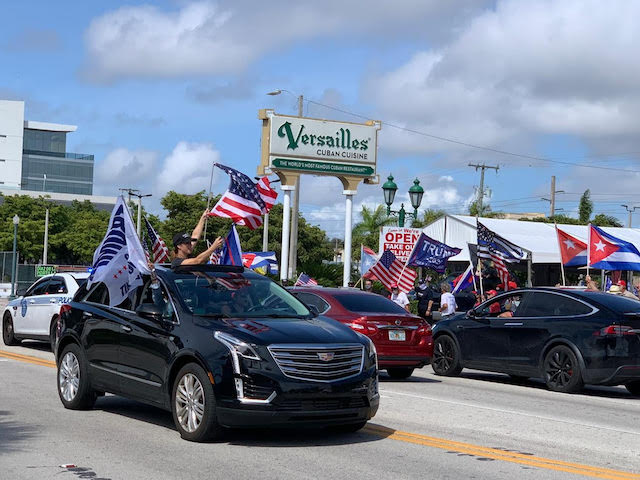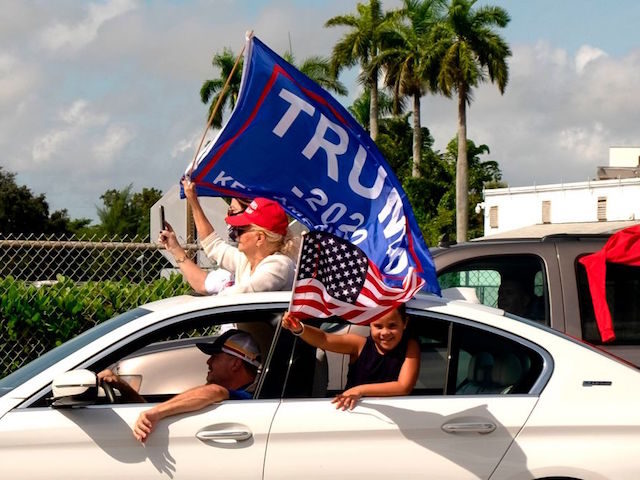Of Young Nations and Caravans
MIAMI, Florida – The cars began to line up at the gates over an hour before the event was set to begin. The gathering for the “Anti-communist and Anti-socialist Caravan for Freedom and Democracy” took place on October 10, 2020, at Magic City Casino, located on NW 7 st and 37 Avenue, in the Flagami district, close to Little Havana, the heart of Miami’s Latin community near Downtown.
The participants did not arrive one or two per car, but rather in groups of four to five per vehicle. The groups often consisted of families: grandparents, parents, and children – a testament to how the cause of the liberation of Cuba has been transmitted inter-generationally for over six decades. Before the afternoon ended, an unprecedentedly massive 30,000-car caravan would take place, driving out of the parking lot at 10 a.m. and finding its way into national headlines and the history of Miami.
By 9 a.m., half an hour before the event was slated to begin, the assigned parking lots were overflowing. The organizers had printed cardboards with numbers on them, from one to 1,000. They sought to carefully number the participants so as to preempt disputes on total participation by the media. The 1,000 cardboards were almost gone by 8:50 a.m.

Caravan against socialism and communism in Miami, Florida, October 10, 2020. (Photo: Daniel Quiróz/Cuban Democratic Directorate)
Greeting the vehicles coming in were gray-polo-wearing teenage volunteers belonging to Students for a Free Cuba, grandchildren and children of Cuban exiles. These kids have grown up as witnesses to the harrowing personal accounts from their families about how Cuba, Nicaragua, and then Venezuela were lost to socialist-communist totalitarianism. The idea of addressing the continued dire human rights situation on the island has motivated them to organize. The grassroots mobilization for the anti-communist caravan inspired them to volunteer for the event.
Car number 19 was driven by José Antonio Rodríguez Sosa. As a young navy cadet in Cuba in 1959, he witnessed up close the Communist takeover of the prestigious Mariel national naval academy where he studied. It became clear to him that the new Communist overlords were reshaping the armed forces into an ideological instrument and not as an institution of the republic. He vowed to resist and spent the next ten years of his life at the helm of rebel ships supported by the CIA, which raided military objectives along the coast and brought in men and supplies to aid the internal underground.
Castro’s imposition of communism initiated a long and bloody civil war waged in the cities, hills, and coasts of the island. Many of its survivors are in exile and their commitment has not waned. The end of CIA support did not mean the end of José Antonio’s efforts and the rest of his life has been dramatically marked by his commitment to the struggle for Cuban freedom. He agreed that October 10, 2020, the anniversary of the start of Cuba’s first war of independence against Spain, was a fitting day to make a statement. He and other veterans of the Cuban freedom struggle joined the caravan.
One of the main exile organizations coordinating the event was precisely the Bay of Pigs veterans of Brigade 2506 led by its president, retired U.S. Colonel and Vietnam veteran Johnny López de la Cruz. Their vow to liberate Cuba, taken when they were as young as the Students for a Free Cuba high school volunteers are now, remains as firm as ever. For the first time in many years, they not only carry that conviction but also have hope.
Many of the participants in the Caravan brought Cuban, Nicaraguan, and Venezuelan flags. Also to be seen were Puerto Rican and Colombian flags, as well as the rainbow flag of the LGBTQ movement – a very formally and informally organized community from the grassroots up, mobilized organically that day.

Puerto Rican flags at the caravan against socialism and communism in Miami, Florida, October 10, 2020. (Photo: Daniel Quiróz/Cuban Democratic Directorate)
There was a great outpouring of both young Cuban recent arrivals and the new generation of Cuban-Americans. A great majority of vehicles had Trump signs and banners. Although the caravan was assembled on a nonpartisan basis, participants were free to bring the symbols they chose. For thousands who turned out that day, Trump’s relentlessly consistent policies of enforcing political and financial sanctions on the Cuban communist regime and its allies in Venezuela and Nicaragua has signified that the current administration seeks true change on the island.
Cuban exiles know communism well. They know its structure and the indoctrination of its militants. They know how it tried to destroy the basic nucleus of Cuban culture: the family. They lived through its persecution and undermining of spiritual faith. They know of its unquenchable, brutal thirst for power over the innermost sanctum of the human person and its multiple methods of thought control.
They know of the concentration camps set up to stamp out social plurality. How a broad range of people, from Jehovah’s Witnesses to artists to homosexuals were herded into those camps to be “re-educated” according to Castro and Ernesto “Che” Guevara’s vision of what a “revolutionary man” should be.
They know how communism mutates, shifting shapes in a chameleon-like fashion to always offer what people seek in desperate situations to lure them into the totalitarian trap. The hammer and sickle symbols and hateful violence against public institutions that raged this summer in the U.S. had all of the call signs that exiles recognize. They’ve seen them before, as well as heard the neo-Marxist babble of so-called educators, entertainers, and politicians seep progressively into the mainstream. Their powerful life experiences do not allow for confusion. Be it in Soviet Russia, Nazi Germany, Maoist China, Castroite Cuba, or the Venezuela of Chávez and Maduro, socialism always brings the same results.
As the caravan proceeded, local radio station La Poderosa 670 AM not only broadcast the event live, but also held a seminar on communism and socialism where leading academic experts on the matter from throughout the hemisphere analyzed and discussed the issue in a thorough way.
Cuban culture is very much about individual freedom and achievement and, therefore, like the American, deeply egalitarian. But equality, equal dignity under God as should be reflected in law, does not mean the artificial sameness imposed by socialism and communism to achieve population control. Individuality signifies plurality.
A free people respects itself and extends that respect to others. The first thing the farmers and landowners who rose up against Spain on October 10, 1868, did was free the slaves and invite them to join the Army of Liberation. The freed slaves eventually became leaders of the new government and army and the sons and grandsons of the farmers and landowners fought and often died under their command. That powerful, active memory of freedom remains in the Cuban psyche. Hence, by the thousands, they have resisted communism in the island or fled it. Both firing squad walls and oceans depths are full of corpses that testify to Cubans’ love for freedom.
October 10 is also the birthday of Jorge Luis García Pérez “Antúnez,” who spent 17 years as a political prisoner in Cuba and is often referred to as “the Cuban Mandela.” He grew up under communism but his own, innate thirst for truth and liberty led him to question the regime and attempt to change it through civil resistance inside the prisons and on the streets. The main speaker at the rally, he was visibly moved by the outpouring of support for the cause that day.
For decades, exiles have seen how their message of freedom for Cuba is either distorted or ignored by many in mainstream media and Hollywood. Poll after phony poll, decade after decade, has decreed the end of the Cuban exile freedom movement. Pundits spewing ideological lines have rambled on about how young Cubans, turning away from their parents, seek to engage and open up to Castroism. These lies have not weakened the community for, in exile, Cubans comprise a young nation with deep truths.
As in 1868, they still deeply believe in individual freedom, in the right to private property, in the right to life, in the rule of law. They deeply love America because it has institutionally enshrined these values and thereby made possible the opportunity to prosper, to be self-reliant, to be free. As a free people, they hold loyalty as a value and are deeply loyal to America.
As with authoritarian colonial Spanish rule, Cubans have rationally sought to recover these freedoms under communism. Repression was the response of the corrupt military governors in the 19th century and, in a much more systematic and cruel way, repression is the response of the current Marxist overlords. That repression has been exported to countries such as Venezuela and Nicaragua. Cubans know that the Marxist oligarchs must be pushed out of power for, if not, Cuba will continue to spiral into decay and despair, and the ideological disease will further uncontrollably spread beyond Cuba’s borders.
Ours has been a lonely, decades-long fight to proclaim this truth. We have not faltered, and have grown in strength from it.
“This is the mother of all caravans,” proclaimed a sign carried by Reynol Rodríguez, one of the key organizers of the event, as he walked in the casino parking lot. Of few words, very tall and still strong, he is now almost 80. He was a minor when he began to fight in the ranks of the Student Directorate for political freedom against the Batista regime, and did not hesitate to continue that fight when Castro installed a communist dictatorship. Over many decades he constantly risked his life and put his family through much sacrifice in that struggle.
He looked around at the turnout, and at the many young people sitting in their cars, surrounding him. “We will be free,” he said under his breath to one of his sons next to him, and held his sign higher.
Dr. Orlando Gutierrez-Boronat is a writer, educator, and co-founder and spokesman for the Cuban Democratic Directorate (Directorio). Directorio was part of the Patriotic Committee organizing October’s Anti-Communist Caravan in Miami.

COMMENTS
Please let us know if you're having issues with commenting.